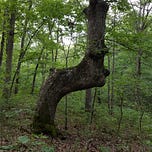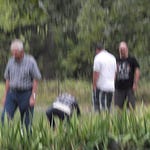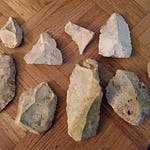At the top of every form we complete are three blanks, “first name,” “middle name or initial,” and “last name.” Every introduction starts with stating our names, “I am…fill-in-the-blank.” Which leads me to ponder: What’s in a name?
Note about the image: This is the latest oddity discovered at Mystery Acres, a grass named “sedge.”
My Mysterious Mind
This calendar year looks as though it will be a “hat-trick” for my husband and I as grandparents. Instead of scoring three goals in a single hockey game, 2024 has already brought us two grandchildren, with a third on the way in December. We welcomed our first granddaughter in early January, our fourth grandson in March, and anticipate the arrival of our fifth grandson in December. Three new grandchildren in one year is beyond exciting! And, with that excitement, is the joy of watching these new members of the family receive their names.
Our family has a loose tradition of passing on family names. Sometimes it happens; sometimes it doesn’t. I don’t have a family name but I passed on my mother’s middle name to my second daughter. She passed that same middle name to her daughter, our only granddaughter. I gave variations of my middle name (Jane) to my oldest daughter as her middle name (Janette) and another variation as the first name to my second daughter (Jennifer). Our son has two middle names, both his father’s names, one of which is a grandfather’s middle name (John).
One of our grandsons has my husband’s name as his middle name, the others carry middle names from their father or other family members’ first names. When our most recent grandson arrived, he was given the middle name of his paternal grandfather’s first name, and the first name of Theodore. I liked the name but it was my sister who immediately noticed the family significance. Our father’s grandfather was named Theodore. Thus, our newest grandson has the name of his great-great-great-grandfather.
The significance of the name is more than just repeating a long-ago label. In his prime, my great-grandfather Theodore played a vital role in the lives of both of my parents, long before there was a connection between my parents. My mother’s parents fell on financial hard times, losing their farm during the depression. My father’s grandfather, Theodore, helped them get another farm. Theodore, whose nickname was Tater, was a successful businessman and used his success to help a young, struggling family. That family would include the young woman, my mother, who would years later marry Tater’s grandson, my father.
What’s in a name? Sometimes a name serves as a connection to previous generations of one’s family. My little Theodore, who is not likely to carry the nickname Tater, is born with a name whose legacy helped forge an important part of his ancestry. Tater’s generosity and kindness is reborn in this new baby. We call him Theo or Teddy, and he is a very sweet little man with an especially good name.
Message from Mystery Acres
Mystery Acres wasn’t the first name we considered for our piece of the forest. At first, I wanted to use a Celtic name to capture my husband’s Scottish heritage. I don’t have a bit of Scotch in me, but he has a “quart of Scotch” in him. We considered names such as “Little Scotland” or “MacGregor Escape.” None seemed to fit the endless mysteries the forest offered us.
First, there are the shaped trees. I have expert speculation regarding their purpose. I could have dendochronology to determine their age. But their true meaning remains a mystery. The hands who shaped them have been gone since the 1850’s. Last fall, one of our guests discovered tether marks on the tree we call Troll, named because of the odd “face” with a huge opening as its “mouth.” I had assumed the wide hole was the result of a natural, albeit mysterious process. Perhaps Troll was also shaped to serve a purpose, maybe as a receptacle for secret messages when the native people became suspicious of their European neighbors. It’s yet another mystery at Mystery Acres.
Second, there are those strange, round rocks, the “Weaubleau eggs.” Scientists discerned the outline of a long-ago meteorite strike in the area, surmising the round rocks are chert nodules, formed from the massive impact, buried over the years hence. My grandsons, various guests, my husband, and I are endlessly fascinated by the treasure-hunting of digging them out of the ground. Each brings a mystery into view, never before seen by anyone.
Third, the forest produces botanical oddities. There are wildflowers, mushrooms, and grasses in abundant variety. On my most recent visit I noticed a type of grass growing in the clearing, one I had not before noticed. “What is that?” I exclaimed. A friend who was visiting knew the name of this strange grass. Sedge. I had never heard of it. Despite exploring the same section of nature for five years, this grass, with its weird triangular stem and other-worldly spheres, was a new mystery to me.
With the mysteriously shaped trees, plethora of botany, and bizarre rocks, you can see why I named this place “Mystery Acres.” (My husband just calls it “the acres.”) Every visit reveals new secrets. The message of Mystery Acres is its name, a name it earns again and again.
Ancient Mystery’s Voice
“I will trust in Your name, for it is good.” (see Psalm 52, verse 9)
The word “name” is used almost a thousand times in the Bible, over a hundred times in the book of Psalms. I recently stumbled across one of those references from Psalm 52. Here the Psalmist declares he can trust in the name of God because it is good. What is God’s name?
When God directed Moses to go to Pharaoh to seek the freedom of the Israelites, Moses wanted to know who he should say sent him. He wanted to be able to use God’s name so there would be no confusion. God’s response was: “I am that I am, tell them ‘I am’ has sent you.” The Hebrew word God used,“Yahweh” (pronounced yah-way), means “I am.”
Weird, huh? When asked to fill in this sentence, “I am [blank],” God didn’t fill in the blank. He just said His name was “I am.” And, hundreds of years later, the writer of Psalms declared that name to be good.
The letters of the Hebrew alphabet are also pict-o-graphs, each can be interpreted separately from their associated imagery. There are four Hebrew letters in the name Yahweh, two of which are repeated. The repeated characters are a call to look or behold. Between those symbols are the images of a peg or nail and the image of a hand or palm. The pictorial translation of the Hebrew word Yahweh is this: Behold the hand; behold the nail.”
Over sixteen centuries before the crucifixion of Jesus Christ, God foreshadowed that sacrifice by the name He gave for Himself to Moses. The writer of Psalms would not have understood the prophetic meaning of the pictorial translation because crucifixion hadn’t yet been invented as a form of capital punishment. The psalmist proclaimed his trust in the name of God as a good name with limited understanding.
Three days after Jesus was crucified, He came back to life. He appeared to His disciples after this resurrection but Thomas wasn’t there. Having missed this important meeting, Thomas was struggling with doubt. Jesus appeared to him and told Thomas to put his finger into the nail mark in His hand. Speaking in Greek, not Hebrew, Jesus told Thomas to look at His hand and where the nail had been.
What’s in a name? When it’s the name of God, there is a lot in a name.
I will trust in Your name, O God, for it is very good.
Living in Mystery
What does it mean to live in the mystery of “good” names? First, it means to give good names to children and pets. A “good name” is one with positive connotations and/or meaningful family connections. This includes formal names and nicknames; avoid assigning a negative name, even in fun. As a young girl, another child reduced my last name to “brat” – it only happened once, but I still remember the hurt. Thankfully, it didn’t catch on.
Dale Carnegie, in his famous How to Win Friends and Influence People, said to “give a dog a good name.” He advised names and nicknames for people and animals that had uplifting associations. For example, it isn’t wise to call a dog “Stupid” or a cat “Pest.” Choose names that people and pets can live up to, not demeaning names. My husband and I named our puggle “Smudgie” because of a dog in a favorite Netflix program (“Glitch”); it fits because her light tan fur is smudged with dark areas on her ears and down the middle of her back. She isn’t able to complete the sentence “I am [blank]” but a child can. The official and unofficial labels we place on children can become attached to their sense of identity and worth. As an old mom to young parents, I advise you to think carefully about any “names” you assign to your children, whether officially or unofficially. The labels we use for them become the labels they use for themselves. Choose names carefully.
Next, living in the mystery of good names involves seeking to earn a “good name,” that is, a good reputation. As a senior in high school, I and each of my classmates, could select a phrase or quote to include under our pictures in the yearbook. I choose, “The way to a good reputation is to endeavor to be what you desire to appear.” Having a reputation is earned by our choices, for the good or the bad. Sometimes a single choice can define one’s entire reputation, making a name synonymous with an action, such as the name Benedict Arnold with being a traitor. The phrase, “his name is mud” has its origins from Samuel Mudd, a medical doctor implicated in the assassination of Abraham Lincoln. Some companies develop such terrible reputations they attempt to “make a new name for themselves” by changing the company name. Good reputations take years to develop, but only a single bad choice to be destroyed. Make wise choices; reputations, and a good name, are built on them.
Lastly, we each can deepen our life in the mystery of a good name by trusting in the great “I AM.” This is the name above all good names, so good it held a mysterious connection to the sacrificial life and love of Jesus. He was also named Immanuel (see Matthew 1:23) which means “God with us.” Many people struggle to trust in God, I suspect at the foundation of their mistrust is a question of God’s goodness. Is God good? He certainly is powerful and enigmatic; but is He trustworthy? Woven throughout His many names is a strand of unlimited and unending goodness, love, and presence, known across millions of people and multiple centuries. We can trust in His name because it is good; He is good.
What’s in a name, especially what’s in a good name, is a rich mystery to consider. Good names start with the formal and informal labels placed on someone; these labels gather a reputation based on individual choices. These few words carry profound value. Choose good names wisely and protect them diligently. And trust in the name above all names, for it is the best of all.
Connecting With Mystery
Dear Lord of All Mystery, thank You for my good name. Help me to make wise choices so the reputation attached to my name is good. Convict me of the damaging “names” I place on others; strengthen me to use good names instead. Thank You for Your good name; help me to trust more completely. Amen.
Notes from Dr. Mac
If you want to do your own investigation of any of the scriptures I use, I suggest you go to Bible Gateway. This free online version of the Bible allows a search of words or phrases in various translations.
You can find previous posts and podcasts in my ARCHIVE and organized compilations in the My “Books” section. You can also find Mystery’s Voice on Spotify .
Do you have thoughts to share? Please leave a comment below or through the Substack App, or email me privately at Dear Dr. Mac. I love to hear from you!














Share this post